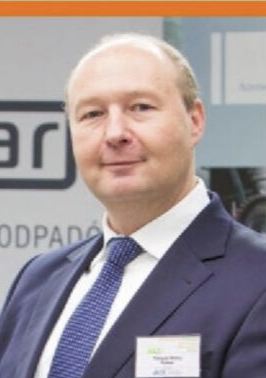Fumar in Waste and Biomass
ISSUE 7(97) August 2023
An RDF-fired boiler is set to be constructed in the city of Nysa
Nyska Energetyka Cieplna (NEC) has undertaken an investment in a steam boiler powered by environmentally sustainable Refuse-Derived Fuel (RDF). This initiative is expected to yield savings for the city within the range of PLN 5-6 million while simultaneously contributing to the enhancement of the energy self-sufficiency of the municipality.

Visualization of the RDF-fired installation in PEC Nysa
NEC delivers heat for the city of Nysa through both the district heating system and local boiler houses, meeting over 45% of the central heating demand. The choice to utilize Refuse-Derived Fuel, or RDF, was primarily driven by two factors – economic and ecological considerations.
Nysa prioritizes the use of RDF fuel
As a result of this investment, NEC will produce 100,000 GJ of heat and 10,000 MWh of electrical energy annually. The boiler’s efficiency will amount to 15,000 Mg a year. The thermal recycling facility will employ the most reliable and environmentally friendly grate technology. It ensures high efficiency of the combustion process; hence, the RDF-fired boiler meets stringent pollutant emission requirements. The implementation of such an installation type enables a reduction of the amount of dust, sulphur and nitrogen produced:
| 10 times less dust | now: 100 mg/m3 | in the new boiler: 10 mg/m3 |
| 3 times less sulphur | now: 1500 mg/m3 | in the new boiler: 50 mg/m3 |
| 2 times less nitrogen | now: 400 mg/m3 | in the new boiler: 200 mg/m3 |
The alternative fuel boiler shall secure ¼ of the annual output. Waldemar Hasiak, Chief Technology Officer at NEC – Nysa, confirms that this translates to a 25% reduction in the reliance on coal and gas, thereby yielding positive environmental implications. RDF is generated through sorting of non-recyclable municipal waste, including items such as wood, wet paper, rags and certain types of plastic. The fuel will be supplied to NEC by the EKOM company, which has been producing it since 2015 at the Regional Waste Management Center in Domaszkowice. Until now, the facility has been producing 10,000 tons of RFD annually. For the new facility, production capacity will be significantly increased. According to laboratory testing conducted several times a year, the fuel manufactured by EKOM consists of 45-65% biomass. A modern CHP plant project scored a maximum number of points (i.e. 100) in the assessment conducted by the National Fund for Environmental Protection and Water Management (NFOŚiGW). Opting for this heating method also translates to lower costs for the company and its customers. Until now, the company has been paying for CO2 emissions the amount of PLN 13 million annually. However, RDF fuel is exempt from this tax, indicating that the cost of heat supplied to households and buildings in Nysa will remain stable or possibly even decrease.
A long-awaited investment
The implementation of the investment had been discussed for many years. “As early as 2013 we knew that we would be focusing on RFD. However, we did not have enough funds to undertake such a large investment. Upon successfully obtaining the funds from the National Fund for Environmental Protection and Water Management, we could initiate our endeavors”, explains Artur Pawlak, the President of the Management Board of NEC – Nysa.
The amount obtained consists partly of a grant (amounting to PLN 49.9 million) and partly of a loan (up to PLN 57.8 million). Anticipated total cost of project implementation is PLN 132.527.596. The contractor of the investment is the consortium of companies which includes WTEC S.A. Wrocław, Richard Kablitz GmbH from Germany and IDERCO S.R.L. from Italy. The agreement has already been signed, and the construction site will be handed over soon. The work is scheduled to commence in September. According to the plan, the construction of the boiler house shall take 30 months. The RDF-fired boiler investment will bring tangible benefits on multiple fronts, bringing the city of Nysa closer to achieving the status of a zero-emission city.
The technology for PEC Nysa will be provided by the Richard Kablitz company, represented in Poland by the Fumar company.

Specifically, what responsibilities do you have?
Tomasz Wolny, President of the Management Board at Fumar, explains:
“In Nysa, Kablitz oversees the boiler island encompassing the furnace, and the water-steam cycle including a turbine, steam condenser and auxiliary devices. Fumar remains an exclusive representative of Kablitz in Poland and has been associated with them for over 15 years. Our main responsibilities include establishing connections with new clients, conducting study work regarding the selection of boiler technology and furnace types, and actively contributing to the preparation of commercial offers. We’re also responsible for maintaining contacts with strategic partners and subcontractors on the Polish market.”
Kablitz is a German supplier of biomass/waste solutions. What is the company’s specialization, and on which market does it operate?
“For 120 years, Kablitz has been operating worldwide, serving several thousand clients. Poland holds significant importance for Kablitz, primarily due to its close geographical proximity and strong business relationships. Kablitz is mainly recognized for its expertise in biomass boilers and grates and is most commonly associated with this type of fuel. However, over the past two decades the company has successfully expanded its product range regarding boilers to include alternative fuel boilers, primarily based on horizontally constructed boiler, featuring the company’s own patented solutions. Currently, Kablitz boilers fired with alternative fuels and waste are predominantly utilized in Germany and Sweden.”
Where in Poland have you already implemented your projects?
“The first biomass boiler with a capacity of 31 MW was supplied by Kablitz in 1995 to Żary, Poland. Currently, we have successfully completed several installations in Poland, including a facility in Szczecinek with a capacity of 25 MW, two installations in Mielec with capacities of 20 MW and 41 MW, and two installations in Iława, each with a capacity of 9,5 MW.”